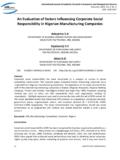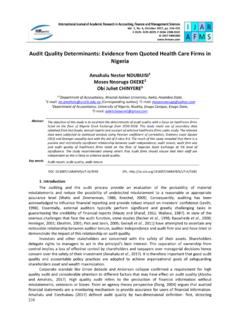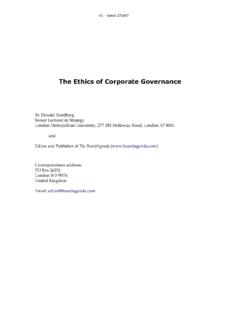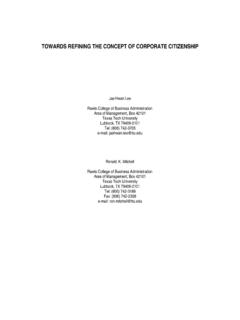Transcription of Special Theme – Health Systems The concept of stewardship ...
1 The concept of stewardship in Health policyRichard B. Saltman1& Odile Ferroussier-Davis2 There is widespread agreement that both the configuration and the application of state authority in the Health sectorshould be realigned in the interest of achieving agreed policy objectives. The desired outcome is frequentlycharacterized as a search for good governance serving the public interest. The present paper examines the proposal inThe World Health Report 2000that the concept of stewardship offers the appropriate basis for reconfiguration. Wetrace the development of stewardship from its initial religious formulation to more recent ecological and sociologicalpermutations. Consideration is given to the potential of stewardship for encouraging state decision-making that isboth normatively based and economically efficient.
2 Various dilemmas that could impede or preclude such a shift instate behaviour are examined. We conclude that the concept of stewardship holds substantial promise if adequatelydeveloped and effectively : public Health administration; government; Health care rationing; Health policy; ethics, institutional; page 737 le re sume en franc ais. En la pa gina 738 figura un resumen en espan attention has been focused over thepast decade on the role of the state in the healthsector. The debate has covered a wide variety oftechnical and political dimensions, ranging frompolicy formulation to implementation, from entre-preneurial innovation to regulatory restrictions, fromfinancial efficiency to social equity, and from publicto private ownership of institutions.
3 Despite con-siderable disciplinary and ideological disagreementthere has been a common thread of interest in howchanges in state behaviour can help to produce betterhealth-related outcomes. Nearly all observers agreethat both the configuration and the application ofstate authority in the Health sector should be realignedso as to achieve desired policy intended outcome has strong overtones of adesire for what is frequently termed good governance,which in turn involves policy-making that serves thepublic interest. Such a new state role conflatesinstitutional process ( efficiency and transparency)with specific substantive outcomes ( Health gainand expenditure control). In order to achieve theseresults the new configuration has to transcendtraditional theories on inherent limitations of stateorganization and behaviour.
4 For instance, it has totranscend Weber s dictum that the only choice inorganizing state institutions is between bureaucracy( a structure of authority based on rules and offices)and dilettantism, unless one reverts to small-scaleorganization (1). It similarly must transcend theconceptual gauntlet thrown down by Downs (2),Niskanen (3), Buchanan (4) and other public choiceeconomists, who contend that civil servants neverserve the state but instead pursue only their ownrational self-interest. Furthermore, the new configu-ration has to accommodate disagreements on whetherpublic officials, acting as agents for the general public,should be delegates or functionaries (5) responding toexplicit electoral instructions, or trustees or fiduciariesfollowing their own judgement on the basis of trustgiven by the people they represent.
5 Most significantly,the newly configured state role should reflect emer-ging thinking about the importance not only of healthcare for individuals but also of the need to design andimplement mechanisms that can achieve greater healthgain among populations (6,7).The present paper explores the proposal inTheWorldHealthReport2000that stewardship is theappropriate basis on which to resolve these dilemmasand reconfigure the role of the state in the healthsector. We examine the conceptual character andimplications of this proposal. Several alternativedefinitions for stewardship are set out and contrastedwith traditional understandings of how the stateexercises power. Consideration is given to the relativestrengths and weaknesses of stewardship as the basisfor state authority in the Health sector, and sugges-tions are made as to how the discussion onstewardship might be moved definitions of stewardshipThe Western concept of stewardship has religiousroots.
6 In Genesis, God appoints humanity as thesteward of creation. The Old Testament also containsthe story of Joseph, sold by his brothers into slavery,1 Professor of Health Policy and Management, Rollins School ofPublic Health , Emory University, 1518 Clifton Road NE, CA 30322 Atlanta, USA. Requests for reprints should be addressed to this School of Public Health , Emory University, Atlanta, Georgia, Theme Health Systems732#World Health Organization 2000 Bulletin of the World Health Organization, 2000,78(6)who becomes Putiphar s and then the Pharaoh ssteward. This parable highlights several key aspects ofstewardship. Drawing from Joseph s example, asteward is a selfless servant, who manages assetswithout owning them, anticipates future trends anddevises grand plans.
7 In the New Testament theparable of the talents, in which a master divides hisgoods between his three servants, emphasizesanother aspect of the concept of stewardship . Themoral of this parable is that when entrusted withsomething of value one has an obligation to improveit. The notion of stewardship as a responsibility forprotecting and developing one s resources lies at theheart of both the Christian and Jewish doctrine of stewardship has also beenemployed in Christian theology to justify the notionof private property and the class structure. Even atthe end of the 19th century the concept was still usedin support of the idea that private property was anatural right (8). God appointed each person to fulfila certain function, for which a certain amount ofwealth was required.
8 Accordingly, God placed wealthon earth for humanity to use in order to accomplishits destiny. Acquisition is, therefore, sanctioned bydivine law. People are only responsible for dutifullyemploying their religious traditions contain a similarconcept. In Islam the institution of Hisba organizespublic administrative functions in both the moral/normative and administrative/technical first Muhtasib, who serves as head of Al Hisba,was appointed in Medina in the 9th century. Thefunctions of the Muhtasib in precolonial Arabsocieties included the regulation of medical practiceand pharmaceuticals and incorporated requirementsregarding the equitable provision of services and thepublic interest (9).The concept of ecological stewardship that hasemerged in northern Europe and North Americaflows directly from the religious tradition.
9 In theecological version, however, the notion of account-ability to God has been largely replaced by that ofintergenerational responsibility. There is, moreover, adebate in the environmental conservation commu-nity regarding the exact contribution of the Judaeo-Christian tradition. Some blame this tradition for thedamage done to the environment over the centuries,arguing that people have interpreted God s mandateto be the earth s steward as a licence to dominate,exploit and destroy it. The response to this is that, onthe contrary, damage has occurred because peopledisregarded God s definitionsof stewardshipThe potential perceived advantage in applying togovernment a term used predominantly to character-ize the role of authority in religious and environ-mental spheres reflects the confluence of theory andpractice.
10 The theoretical dimension can be seen in thegrowth of academic efforts to develop a generaltheory of the state aimed at explaining the behaviourof states (10). The practical input had three aspects:the collapse of the Soviet Union and the need toreconstitute previously communist states; the col-lapse of government following civil wars in Bosnia,Cambodia, Lebanon, Somalia, Sudan and othercountries; and the rise of globalization and thesemi-sovereign roles of private transnational cor-porations. The combined impact of these theoreticaland actual events has served to concentrate theattention of academics and international agencies onthe importance of well-functioning states in theachievement of social and economic term stewardship , as it relates to thestate, has been defined in various related ways.

















